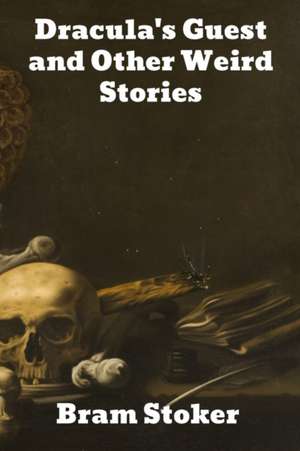Dracula's Guest and Other Weird Stories
Autor Bram Stokeren Limba Engleză Paperback – 30 apr 1914
| Toate formatele și edițiile | Preț | Express |
|---|---|---|
| Paperback (2) | 71.60 lei 22-36 zile | |
| CreateSpace Independent Publishing Platform – | 71.60 lei 22-36 zile | |
| Binker North – 30 apr 1914 | 80.59 lei 43-57 zile | |
| Hardback (1) | 237.80 lei 38-44 zile | |
| Throne Classics – 18 aug 2019 | 237.80 lei 38-44 zile |
Preț: 80.59 lei
Nou
Puncte Express: 121
Preț estimativ în valută:
15.42€ • 16.14$ • 12.84£
15.42€ • 16.14$ • 12.84£
Carte tipărită la comandă
Livrare economică 31 martie-14 aprilie
Preluare comenzi: 021 569.72.76
Specificații
ISBN-13: 9781989743669
ISBN-10: 1989743668
Pagini: 168
Dimensiuni: 152 x 229 x 10 mm
Greutate: 0.23 kg
Editura: Binker North
ISBN-10: 1989743668
Pagini: 168
Dimensiuni: 152 x 229 x 10 mm
Greutate: 0.23 kg
Editura: Binker North
Notă biografică
Abraham "Bram" Stoker (8 November 1847 - 20 April 1912) was an Irish author, best known today for his 1897 Gothic novel Dracula. During his lifetime, he was better known as the personal assistant of actor Sir Henry Irving, and business manager of the Lyceum Theatre in London, which Irving owned. Stoker became interested in the theatre while a student through his friend Dr. Maunsell. While working for the Irish Civil Service, he became the theatre critic for the Dublin Evening Mail,[7] which was co-owned by Sheridan Le Fanu, an author of Gothic tales. Theatre critics were held in low esteem, but he attracted notice by the quality of his reviews. In December 1876, he gave a favourable review of Henry Irving's Hamlet at the Theatre Royal in Dublin. Irving invited Stoker for dinner at the Shelbourne Hotel where he was staying, and they became friends. Stoker also wrote stories, and "The Crystal Cup" was published by the London Society in 1872, followed by "The Chain of Destiny" in four parts in The Shamrock. In 1876 while a civil servant in Dublin, Stoker wrote the non-fiction book The Duties of Clerks of Petty Sessions in Ireland (published 1879) which remained a standard work.[5] Furthermore, he possessed an interest in art, and was a founder of the Dublin Sketching Club in 1879.
